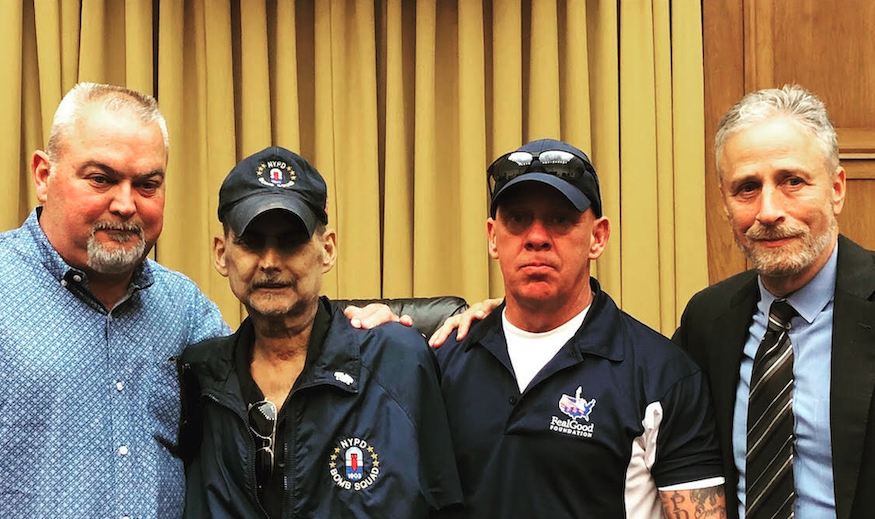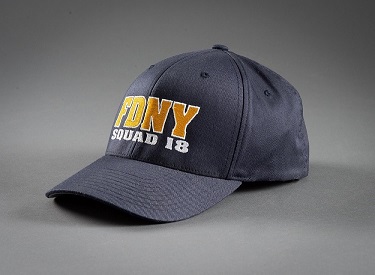Rescue & Recovery at 20: Phil Alvarez, Suffolk PD
Rescue & Recovery at 20: Phil Alvarez, Suffolk PD
- May 25, 2022

From left: Phil Alvarez; his brother Luis, a first responder who died from 9/11-related health issues; Jon Feal, a retired construction worker who survived 9/11 and became an advocate for first responders; the writer and comedian Jon Stewart, a long-time advocate for first responder health benefits.
Phil Alvarez was a Suffolk County Police detective on 9/11. His brother Luis, an NYPD detective, spent months at Ground Zero and ultimately died in 2019 from a related illness. The following Q&A with Alvarez is part of our ongoing series highlighting the stories of those most closely involved with the rescue and recovery efforts, which formally came to an end 20 years ago this coming Monday.
Ahead of our May 30th commemoration, Alvarez will speak as a panelist at our special public program, "Advocacy and Activism," alongside fellow first responder Rob Serra and film director Bridget Gormley, whose firefighter father also succumbed to 9/11-related illness.
Where were you on 9/11?
I was a Suffolk County Police Detective, living on Long Island, watching the terror unfold on television.
What role did you and/or your family member play in the rescue, recovery, and relief efforts?
My brother, NYPD Detective Luis (Lou) Alvarez, and his unit were mobilized to Ground Zero for search, rescue, and recovery. Many including Lou were there for three months or more.
Applause after Luis Alvarez (center, seated) and Jon Stewart testify before Congress in support of permanent authorization of the VCF. Phil Alvarez stands in the audience, in light blue shirt.
How was your brother impacted by his time at Ground Zero?
My brother, Luis, knew shortly after arriving at Ground Zero that the rescue mission would quickly become one of recovery. He felt, out of honor and respect, that families who lost loved ones were owed their remains, so that they could have closure. He felt that was paramount and took it as a personal quest.
Lou was diagnosed in 2016 with colorectal cancer that had metastasized to his liver. His cancer was certified by the World Trade Center Health Program as stemming from exposure to the toxins at Ground Zero. This began a new mission for my brother: find all those that had been there with him and make sure they had access to health coverage and compensation. My brother became a 9/11 victim advocate and the face of the fight for the permanent authorization of the September 11th Victim Compensation Fund - which culminated in the “Never Forget the Heroes: James Zadroga, Ray Pfeifer, and Luis Alvarez Permanent Authorization of the September 11th Victim Compensation Fund Act.” It was signed into law [in July 2019] exactly one month after he passed, funding the VCF through the year 2090. This came weeks after he testified before Congress alongside many other advocates including comedian/activist [and Museum board member] Jon Stewart for the permanent authorization bill.
What does May 30th mean to you?
May 30th reminds me of all the brave souls that responded to Ground Zero to help battle the absolute destruction and terror in New York City. They responded so that a country that had been brought to its knees by terrorists could show the world that we could work together without thoughts of race, color, politics, or religion and help each other. May 30th is also a time for me to remember and honor all the heroes we have lost due to illnesses contracted from the toxins at Ground Zero. Besides the initial 23 NYPD heroes who died when the towers fell, my brother was the 222nd to die from his time spent at Ground Zero.
Why is it important for you to share your story - and the stories of others - with the generation now growing up with no memory of September 11th?
It is important for those with no memory of September 11th to hear the individual stories about how a beautiful day in NYC, blue skies without a cloud to be seen, became one of the darkest days in the history of the world and it changed how we live. But it also is important to tell how a nation came together to survive this dark day.
Anything else you’d like to add?
My thoughts and prayers are with all those who suffered and are still suffering from September 11th, 2001. May God bless us all!
Compiled by Caitlyn Best, Government and Community Affairs Coordinator
See Also:
CNN
Previous Post
Rescue & Recovery at 20: Rob Serra, FDNY

Rob Serra left the FDNY Training Academy a mere one day before the attacks of 9/11. As we gear up for the 20th anniversary of the formal end to rescue and recovery efforts at Ground Zero, he talks about his ordeal and the long-lasting impact it had on his life and career.
Next Post
Rescue & Recovery at 20: Dr. Alison Thompson, Civilian Relief Worker
September 11th ultimately became the first day of Dr. Alison Thompson's full-time humanitarian first responder career. She spent nine months at Ground Zero. In today's installment of our series marking the 20th anniversary of the formal end to rescue and recovery operations, Thompson shares her personal recollections and perspectives.